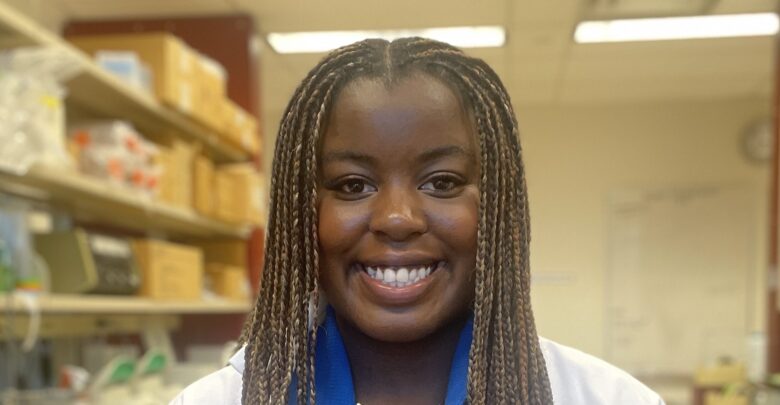Humans of UAlberta: Emma Kasinyabo
Kasinyabo recently graduated from the immunology and infection program at the University of Alberta and is currently researching new treatments for hepatitis B.
 Emma Kasinyabo
Emma KasinyaboShortly after taking the University of Alberta’s MMI 113 class on medical microbiology for health care professionals, Emma Kasinyabo became really sick.
“I remember I ended up having infectious disease doctors treat me. There’d be residents and students throwing out these terms and words I just learned. Infectious disease doctors are really informative, which I really liked,” Kasinyabo said.
Kasinyabo ended up missing the rest of the semester, so she spent her time reading about infectious diseases. During her second year she decided to switch into the immunology and infection program. She graduated from the program in June 2023.
“There’s different things that [viruses] do to escape our immune systems or trick our bodies,” Kasinyabo says
Kasinyabo is passionate about translational research — research that can be applied to helping humans. She’s specifically interested in the interaction between pathogens and the body. A pathogen is an organism that produces disease, affecting its host.
“With viruses in particular, since they’re so small, some of them are way more susceptible to mutations. There’s different things that they do to escape our immune systems or trick our bodies,” Kasinyabo said. “The things that [bodies] do to combat the virus mechanisms are interesting. But then, the virus also comes up with ways to avoid our ways of treating it. I think that’s really interesting.”
Kasinyabo emigrated from the Democratic Republic of the Congo as an infant. She immigrated with only her parents and brothers. Excluding her uncle, aunt, and cousin who came to Canada later on, the rest of her family stayed overseas in Congo.
“If there was a phone call [from Congo], it would be like, ‘someone just died.’ In my house it would constantly be like, ‘this person’s sick, and this person’s sick.’ My dad had 10 brothers and sisters, and a bunch of them passed away,” Kasinyabo said. She added that her family’s experiences in Congo played a part in her interests and field of study.
“It’s devastating. Some of the things they passed away from are ridiculous because [they’re] treatable. Growing up, it was definitely this big thing in my head and in my house where it was like, ‘we have to help our family in Congo. They’re going through a lot right now.'”
Kasinyabo’s work with U School and on IMINSA, research tackling chronic hepatitis B
In Kasinyabo’s last year, she served as the vice-president of the Immunology and Infection Students’ Association (IMINSA). Her biggest focuses included planning an Introduction to Research Night along with other similar student associations, and working with U School.
In U School, students grades three to nine attend the U of A for a week-long immersion experience. The free program is “rooted in the belief that university should be accessible to all students as a place to grow and learn,” according to their website.
Participation is limited to classes from schools in Edmonton’s socially vulnerable areas, Indigenous schools in Edmonton and the Edmonton Metropolitan Region (EMR), and rural schools in the EMR.
“We wanted to talk to them about the program, the research, and different career options that you get with doing a science degree. The other half was teaching them about what a pathogen is,” Kasinyabo said. “We talked to them about different types of bacteria, viruses, and parasites, and the differences between the three.”
She helped plan activities that showed participants the effects pathogens can have on humans and that not all bacteria is bad.
Kasinyabo is currently doing research as a summer student, hoping to begin her master’s in the near future. She is working with Vanessa Meier-Stephenson, an assistant professor in the faculty of medicine and dentistry. Kasinyabo’s research involves looking for new ways to treat chronic hepatitis B, a liver infection.
Kasinyabo said that current drugs for chronic hepatitis B only target a unique step that the virus takes. However, “once you get off that drug, the virus is going to continue to make more of itself and you’ll get really sick.”
“The virus is still producing itself. You’re just stopping one step. We want to target that chronic form and hopefully prevent the other steps from happening.”




